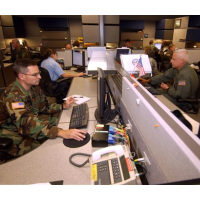Fusion Centers Combine Uselessness, Waste and Privacy Encroachments in the Fight against Terrorism

A new Senate report says that so-called “fusion centers” meant to unite federal, state and local anti-terrorism efforts were an abject failure, and California provided some prime examples of their uselessness.
Intelligence from the fusion centers was “oftentimes shoddy, rarely timely, sometimes endangering citizens’ civil liberties and Privacy Act protections, occasionally taken from already-published public sources, and more often than not unrelated to terrorism,” according to the report from the Senate Committee on Homeland Security and Governmental Affairs.
The 70 state and local fusion centers, partially paid for with federal funds since their inception in 2003, were created to “detect, disrupt, and respond to domestic terrorist activities.” But the committee found that public claims by the Department of Homeland Security (DHS) about their effectiveness “were not always accurate.”
California is home to four regional fusion centers and one of them is in San Diego, where investigators questioned the $25,000 purchase of high tech surveillance equipment that consisted of tiny cameras hidden in shirt buttons, hats and water bottles. There were also 55 flat-screen televisions used primarily to watch the news.
The center spent $200,000 on 116 computers, monitors and related equipment for its 80 employees. When investigators asked why they needed more computers than there were employees, they were told that not all the equipment was being used by the fusion center.
“It is unclear how the San Diego fusion center's use of federal grant funds to buy surveillance equipment assisted the primary mission of DHS's fusion center effort,” the report said.
Senate investigators found problems “with nearly every significant aspect of DHS’ involvement with fusion centers” and found that department officials knew about problems but kept them from Congress. In particular, the department kept to itself a 2010 DHS report on many of these same problems.
The investigation could not find a single terrorist threat that had been uncovered, “nor could it identify a single contribution from a fusion center that resulted in disruption of a terrorist plot.” Most of the fusion center intelligence reports were about criminal activities, like human trafficking, rather than terrorism.
The centers circulated information about Ron Paul supporters, the ACLU, activists on both sides of the abortion debate, war protesters, advocates of gun rights and Muslim community group and mosque activities—including book recommendations and parenting classes—that were clearly innocent. Although the federal government is barred from storing information about First Amendment activities unrelated to criminal activity, DHS kept these reports on its computers, despite knowing they were worthless.
DHS failed to police the states’ and localities’ operation of the fusion centers, resulting in wasted money. And there was a lot of money to waste, although how much is apparently anyone’s guess, according to the Senate report, because federal dollars were doled out through a convoluted grants process.
DHS officials offered estimates that between $289 million and $1.4 billion had been spent on the centers.
The Senate report did not go unanswered. DHS officials called it “out of date, inaccurate and misleading,” claiming that they have fixed many of the problems set forth in the report. Mike Sena, president of the National Fusion Center Association, a private lobbying organization “funded by corporations who seek to do business with fusion centers,” contended that fusion centers helped provide accurate and timely data on recent high-profile shootings in Colorado and Wisconsin.
Neither of those crimes were acts of terrorism.
–Ken Broder
To Learn More:
Senate Report Savages Terrorism “Fusion Centers” as Useless (by Andrew Becker and G.W. Schulz, California Watch)
Senate Report Says National Intelligence Fusion Centers Have Been Useless (by R. Jeffrey Smith, The Center for Public Integrity)
Federal Support for and Involvement in State and Local Fusion Centers (U.S. Senate Committee on Homeland Security and Governmental Affairs) (pdf)
Security Program Slammed by Senate Report for Improperly Collecting Info on Innocent Citizens (by Matt Apuzzo and Eileen Sullivan, Associated Press)
- Top Stories
- Controversies
- Where is the Money Going?
- California and the Nation
- Appointments and Resignations
- Unusual News
- Latest News
- California Forbids U.S. Immigration Agents from Pretending to be Police
- California Lawmakers Urged to Strip “Self-Dealing” Tax Board of Its Duties
- Big Oil’s Grip on California
- Santa Cruz Police See Homeland Security Betrayal in Use of Gang Roundup as Cover for Immigration Raid
- Oil Companies Face Deadline to Stop Polluting California Groundwater





